Over the tournaments, victories and (many) defeats, I realize how much competition is formative, both for young and old! In particular, nothing beats competition to force us to remain humble. If one day we claim to have become a good tennis player, some tournaments will soon bring us back to earth. What’s more, loss is the best source of learning and development for the tennis player, provided he knows how to learn from it.
These lessons from sport apply just as well to the stock market. The investor who develops the dangerous sense of being invincible will quickly be brought down to earth by the stock markets.
First, the vast world of the stock market will remind us repeatedly that it is futile to try to predict stock market movements. In my opinion, there are simply too many unpredictable variables that can influence the price of the stock market to hope to predict its movements with any success. Take inflation, a variable that has been in the headlines for the past few months: do you really believe that it is possible to predict how it will develop over the next few weeks and months?
Second, the sense of confidence and security that comes with a long bull market will sooner or later be shattered by a good market correction or a bear market. Over the past two decades, the bursting of the tech bubble in 2000, the 2008-2009 financial crisis and the COVID-19 pandemic have cooled many overconfident investors. In my opinion, the investor should also not get carried away by the strong rally in the stock markets for the past year or more.
Third, the investor who does his homework perfectly – who goes through a company’s financial statements, analyzes its business models, studies its industry, measures the various risks, takes the time to properly assess its value – can never be right every time. Investing in a stock will always come with risk. As Warren Buffett said, “Unless you can watch your stock holding decline by 50% without becoming panic-stricken, you should not be in the stock market.” In the investment world, you don’t have to be right every time to be successful; I have always liked to say that you just have to be right more often than you are wrong.
Finally, the stock market investor who ventures outside his area of expertise will, in my opinion, be quickly put in his place. Investing in start-ups or turnarounds, using options or margin strategies, betting a substantial portion of your portfolio in a single stock – these are all ways of the overconfident investor.
Even the greatest champions of tennis and the stock market, Roger Federer and Warren Buffett, suffered many defeats during their long careers.
My passions for tennis and the stock market have taught me to approach them on a probabilistic basis. The one who succeeds will be the one who is right more often than he is wrong. Also, like in tennis, you have to be humble and learn from your failures so that you don’t repeat them (too often).
The humble investor and tennis player prepare professionally before every game or before every investment decision. Each knows he must do his homework properly if he wants to put the odds in his favour. He also knows that if he takes his opponent lightly, sooner or later he will get a big slap of modesty in the face.





